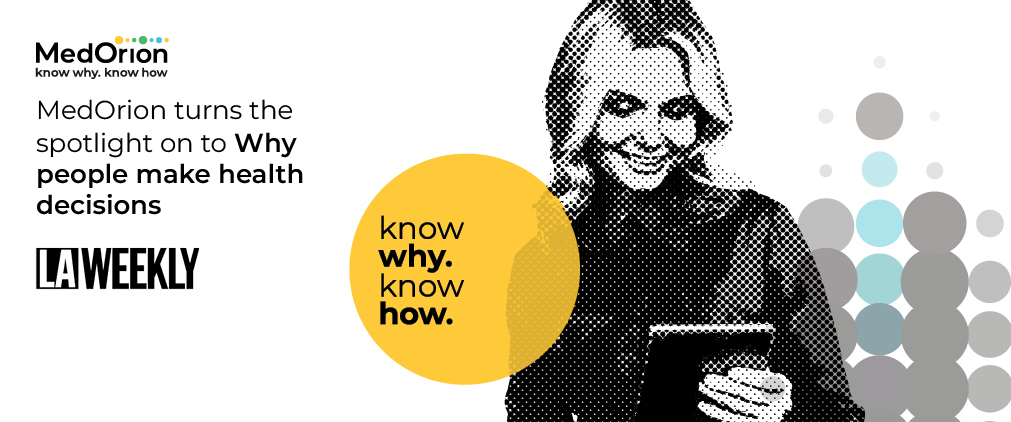MedOrion turns the spotlight on to why people make health decisions
LA WEEKLY, MARCH 7, 2022
Better health outcomes today depend on skillful physicians, the capabilities of technology to power health solutions, and ultimately the patient’s own decisions. Yet the latter is too often overlooked, considering up until now it has been virtually impossible to determine why people make certain choices regarding their health.
That’s particularly true when people choose to refuse a clearly-needed treatment, for example. So why do plan members make the choices they make? Some people are apprehensive about needles, while others are skeptical of vaccinations, and others yet might even worry about the cost of a necessary treatment. Whatever the reasoning, understanding why people make specific health-related decisions starts with a conversation.
For health plans, understanding motivations behind health-related decisions significantly enhances the health outcomes of their members if they utilize the right data and approach the paradigm correctly. And though human reasoning remains a difficult nut to crack, it also represents one of the most fascinating and potentially-disruptive battlegrounds to produce better outcomes.
None have recognized this more than MedOrion, who, after winning Pfizer’s Vaccines Global Innovation Challenge, is guiding health plans’ members toward real world adapted care, through personal relevant member interaction and better health related decisions with the first end-to-end Health-Behavior-Management platform.

Exploring healthcare’s ‘WHY’
MedOrion leverages the theory of planned behavior (TPB), based on the idea that our behavior is motivated by our attitudes. Do we, for instance, think getting a flu shot will reduce our risk? What about the peer pressure of what we believe other people do or expect us to do, and our confidence that we can perform the behavior? A combination of these elements determines the likelihood that we will perform a specific behavior. Indeed, these can change with exposure to new information, which is where positive personally-relevant engagement can ultimately be utilized to change behavior and initiate better health outcomes.
One of the most useful applications of this theory is to determine whether you need to persuade people to change their behavior, or just lightly nudge them toward intended behavior through reinforcement. And it’s in these very intangibles that healthcare is able to start engaging more effectively with the patient.
Using artificial intelligence, MedOrion’s Health Behavior Management platform empowers health plans to switch away from outsourced member-engagement toward a focus on real, long-term behavioral change. Their system analyzes each members’ claims, as well as clinical and demographic information, to create insights into members’ concerns regarding a variety of measures including medications, vaccines, and cancer screening.
The company incorporates a range of theories from behavioral science with its proprietary technology to identify the most pertinent barriers to action. Once identified, MedOrion’s platform automatically generates a persuasive communication strategy deemed most suitable for that person.
MedOrion’s visionary efforts to create better healthcare outcomes have already started yielding impressive results and positive stories. Particularly with regards to COVID-19, one of the company’s early successes was working to increase HPV vaccination rates among 14 year olds in a large HMO composed of more than 2.5 million members. By addressing each parent’s health decision barrier when it came to vaccinating their adolescents, they were able to see a 6-12 percent increase in vaccination uptake through a personal relevant communication approach.
Notably, one of the more heartwarming effects of the project was seeing, as Adi Jacobson, VP of Marketing at MedOrion puts it, “the transformational journey each parent underwent, who responded profoundly to having their concerns understood and addressed.” Simply by learning to “see” people through the perspective of behavioral science in scale through AI, MedOrion is finding ways to help them change their behavior and affect better health, both in the short and in the long term. Let’s just hope more companies involved in healthcare begin to follow suit.
